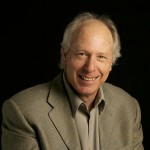Here is a link to my Tuesday column about Jim Barnett. The full text runs below:
I write this column with sadness. This is Jim Barnett’s last season as Warriors’ television analyst, his 29th. I should have written this column sooner to honor the man. I have been remiss.
From what I have read, from what I hear, Barnett and the Warriors made a mutual decision for Barnett to step away. He soon will turn 70 and that may be part of it, although he comes across young. His voice is young. His face is young. He knows his hoops and loves his hoops and he conveys that knowledge and love on air. He isn’t one of those guys always talking about what Oscar
Robertson or Jerry West or Rick Barry did. He is current.
I wish the Warriors and Barnett would make a mutual decision to cancel the first mutual decision. I don’t want Jim Barnett to leave. I bet you feel the same way.
Barnett is a perfect complement to play-by-play man Bob Fitzgerald. Fitzgerald is an enthusiast. Sure Barnett is enthusiastic, but he was the Celtics’ first pick in 1966, he played in the NBA for 11 seasons for seven teams, and he measures his enthusiasm for the Warriors with a vast history of personal knowledge. He is a walking hoops encyclopedia. He is honest. He praises the Warriors but he also gives concise analysis of what the Warriors did wrong, what they need to do better, and why. He is enthusiastic about the opponent, praising openly and wholeheartedly.
He is what I call an East-Coast-style analyst. On the East Coast — especially in New York — announcers place truth above rooting, although they also root for their team. When they are forthright about what their team did wrong, their praise rings even louder. When Barnett praises Draymond Green, you understand the praise fits into a large context, a context of every great player who played in the NBA. Praise from Barnett means something.
I once saw Barnett kick a ball into the stands. This was before I was a sports writer. He played for the Warriors from 1971-1974 and I swear he kicked a ball into the stands. He probably was worked up. He did things like that. He was different. Still is. He is a man always on the verge of having fun. John Havlicek nicknamed him Crazy Horse.
Sometimes I’ll see him before a Warriors game and I’ll ask him a basketball question, and he’ll lead me into the hallway outside the press room, and he’ll tell me to stand a certain way, and he’ll start putting basketball moves on me, Barnett wearing a coat and tie.
He might have makeup on because he’s going on air.
I’m standing there like a goof and there’s Jim Barnett wheeling and dealing as people walk by wondering who these two nuts are, and then he’ll drive past me with his imaginary ball and score his imaginary basket mounted on the hallway wall, and I want to applaud because I just saw Barnett travel down the corridor of years and become a player again for a moment, feeling it, doing it, being it.
And he brings that love to his broadcasts. You hear it in his voice. He makes a lay person understand hoops. He never uses jargon. He talks ball. Plain ball. He understands every position on the court, knows what each player should do every second of that 48-minute game, although I don’t believe he could coach. Too excitable. Excitable is good in a broadcaster.
And he’s smart. When the game approaches its conclusion, he explains time, tells us how basketball time works. Basketball time is different from real time. Barnett is a time explainer. We need a time explainer. He tells us how many possessions a team can get out of those remaining seconds and when the team needs to take a shot and why and which shot to take. And he’s usually right.
Why? Because he used play, played with time. And as he broadcasts, he projects himself onto the court and he gets the feel, understands how he would work the clock. And he tells us. This clock-management angle is one of his specialties and he gets us thinking a certain way — thinking like a player.
I ask him about retired players. I will ask him about Walt Frazier, his teammate on the Knicks. And he will smile. It’s almost love he shows. He calls Frazier a great player and a great man. Jim Barnett is what you call a universal liker. He is positive and optimistic. We need people like him in our lives, need people like him in our ears.
When I shake hands with Barnett, I tell myself, “I just shook a hand that touched a ball that Bill Russell touched.” I am experiencing basketball history through touch. We’re about to lose the touch and the sound.

